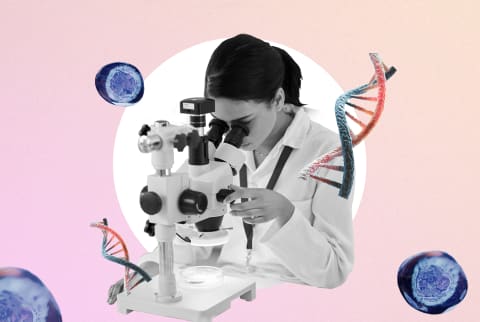Now, your body has a lot of enzymes, but sirtuins are exceptionally remarkable. “Sirtuins play an important role in managing healthy cellular functioning,” explains Kate Denniston, N.D., a licensed naturopathic doctor and founder of Los Angeles Integrative Health. They’re involved in a wide variety of cellular processes involved in aging, along with diseases associated with age. But sirtuins can’t do their thing alone. They’re totally dependent on a molecule called nicotinamide dinucleotide (NAD+). (We’ll elaborate on this guy in a bit.) In fact, without NAD+, sirtuins are unable to carry out their enzymatic duties. To date, seven sirtuins1 have been identified in mammals thus far. All seven sirtuins boast similar structural characteristics, but each one works in different ways. That’s because sirtuins—like all enzymes—are highly selective. In other words, each sirtuin specializes in regulating unique (and crucial) cellular functions. You can think of sirtuins as a family whose members are physically similar but have different talents. For starters, sirtuins help repair DNA damage3, the main cause of cellular senescence. This includes damage like oxidative stress, one of your cells’ worst enemies. Sirtuins also delay the shortening of telomeres, the DNA “caps” at the ends of a chromosome. (The natural process of aging is due to telomere shortening, by the way.) Additionally, sirtuins regulate “mitochondrial biogenesis, or the creation of new mitochondria,” says Petersen. “[These] are the power plants of your cells,” which means they produce the energy your cells need to function. Sirtuins also “improve the connection between the nucleus and mitochondria so that the mitochondria work better,” adds Denniston. But that’s not all. These vital enzymes are necessary for normal cellular metabolism and homeostasis, too. They also “inhibit inflammation, mobilize fats, and regulate the release of insulin,” notes Petersen. With that said, it’s unsurprising that sirtuins are implicated in the development of many chronic conditions—from cardiovascular diseases (like hypertension) and neurodegenerative diseases (like Alzheimer’s). Let’s just say healthy aging simply isn’t possible without these essential enzymes. What’s more, “changes in NAD+ levels affect sirtuin activity,” shares Denniston. Whereas higher levels of NAD+ increase their activity, lower levels have the opposite effect. The latter typically happens during aging, disrupting how the nucleus and mitochondria communicate4. Essentially, without enough NAD+ in the arena, sirtuins can’t function properly. Without enough NAD+, your body’s sirtuin function is limited as well. But fortunately, it’s possible to support your NAD+ (and therefore, sirtuins) by supplementing with nicotinamide riboside5 (NR). “NR is a derivative of niacin (vitamin B3) and a precursor to NAD+,” explains Denniston. In the body, NR is converted into nicotinamide mononucleotide (NMN) and then to NAD+, says Petersen. Because of their effect on NAD+, NR supplements are known as NAD+ enhancers. However, in order to effectively affect your sirtuins, it’s best to use high-quality NR supplements, notes Petersen. As for how to take them? “Take these in the morning and early afternoon, when you’re more active. Taking them in the evening could interrupt sleep,” she adds. Other than taking an high-quality NR supplement, you can support your sirtuins even more; Petersen recommends focusing on resveratrol. This polyphenol, or plant chemical, is a potent sirtuin-activating compound. It’s mainly found in cacao, blueberries, cranberries, and red grapes, says Denniston.




